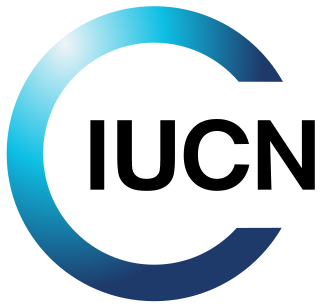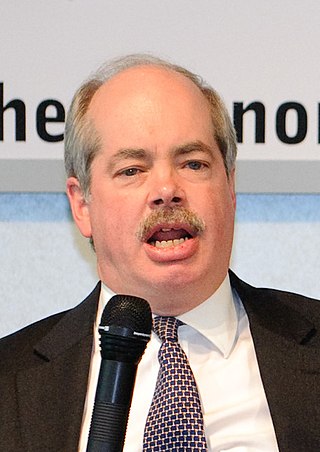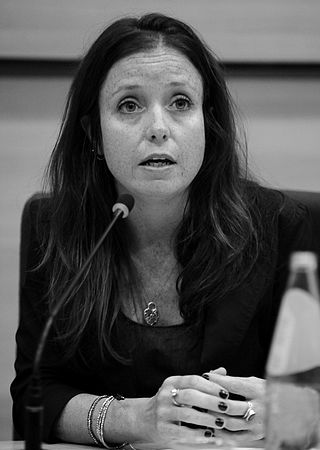The State of the World (SoW) was a series of books published annually from 1984 to 2017 by the U.S. based Worldwatch Institute, a thinktank that was founded in the 1970s by renowned environmentalist Lester R. Brown and ceased operations in 2017. The series attempted to identify the planet's most significant environmental challenges.

The International Union for Conservation of Nature (IUCN) is an international organization working in the field of nature conservation and sustainable use of natural resources. Founded in 1948, IUCN has become the global authority on the status of the natural world and the measures needed to safeguard it. It is involved in data gathering and analysis, research, field projects, advocacy, and education. IUCN's mission is to "influence, encourage and assist societies throughout the world to conserve nature and to ensure that any use of natural resources is equitable and ecologically sustainable".
Overconsumption describes a situation where a consumer overuses their available goods and services to where they can't, or don't want to, replenish or reuse them. In microeconomics, this may be described as the point where the marginal cost of a consumer is greater than their marginal utility. The term overconsumption is quite controversial in use and does not necessarily have a single unifying definition. When used to refer to natural resources to the point where the environment is negatively affected, it is synonymous with the term overexploitation. However, when used in the broader economic sense, overconsumption can refer to all types of goods and services, including manmade ones, e.g. "the overconsumption of alcohol can lead to alcohol poisoning". Overconsumption is driven by several factors of the current global economy, including forces like consumerism, planned obsolescence, economic materialism, and other unsustainable business models and can be contrasted with sustainable consumption.

The Club of Rome is a nonprofit, informal organization of intellectuals and business leaders whose goal is a critical discussion of pressing global issues. The Club of Rome was founded in 1968 at Accademia dei Lincei in Rome, Italy. It consists of over one hundred full members selected from notable scientists, economists, business leaders and former politicians from around the globe. It stimulated considerable public attention in 1972 with the first report to the Club of Rome, The Limits to Growth. Since 1 July 2008, the organization has been based in Winterthur, Switzerland.
The ecological footprint measures human demand on natural capital, i.e. the quantity of nature it takes to support people and their economies. It tracks human demand on nature through an ecological accounting system. The accounts contrast the biologically productive area people use to satisfy their consumption to the biologically productive area available within a region, nation, or the world (biocapacity). Biocapacity is the productive area that can regenerate what people demand from nature. Therefore, the metric is a measure of human impact on the environment. As Ecological Footprint accounts measure to what extent human activities operate within the means of our planet, they are a central metric for sustainability.
Eco-capitalism, also known as environmental capitalism or (sometimes) green capitalism, is the view that capital exists in nature as "natural capital" on which all wealth depends. Therefore, governments should use market-based policy-instruments to resolve environmental problems.

Lester Russel Brown is an American environmental analyst, founder of the Worldwatch Institute, and founder and former president of the Earth Policy Institute, a nonprofit research organization based in Washington, D.C. BBC Radio commentator Peter Day referred to him as "one of the great pioneer environmentalists."

The International Water Management Institute (IWMI) is a non-profit international water management research organisation under the CGIAR with its headquarters in Colombo, Sri Lanka, and offices across Africa and Asia. Research at the Institute focuses on improving how water and land resources are managed, with the aim of underpinning food security and reducing poverty while safeguarding the environment.

Environmental vegetarianism is the practice of vegetarianism that is motivated by the desire to create a sustainable diet, which avoids the negative environmental impact of meat production. Livestock as a whole is estimated to be responsible for around 15% of global greenhouse gas emissions. As a result, significant reduction in meat consumption has been advocated by, among others, the Intergovernmental Panel on Climate Change in their 2019 special report and as part of the 2017 World Scientists' Warning to Humanity.
Corporate Knights is a media and research company based in Toronto, Canada, focused on advancing a sustainable economy. The company publishes a magazine, Corporate Knights, and produces global rankings, research reports, and financial product ratings based on corporate and environmental sustainability performance, including the "Global 100 Most Sustainable Corporations in the World" and the "Best 50 Corporate Citizens in Canada".
Earth Policy Institute was an independent non-profit environmental organization based in Washington, D.C., in the United States. It was founded by Lester R. Brown in 2001 and functioned as an environmental think tank, providing research and analysis on environmental indicators and making policy and lifestyle recommendations aimed at promoting environmental and economic sustainability.

Environmental migrants are people who are forced to leave their home region due to sudden or long-term changes to their local or regional environment. These changes compromise their well-being or livelihood, and include increased drought, desertification, sea level rise, and disruption of seasonal weather patterns. Though there is no uniform, clear-cut definition of environmental migration, the idea is gaining attention as policy-makers and environmental and social scientists attempt to conceptualize the potential social effects of climate change and other environmental degradation, such a deforestation or overexploitation.
The International Institute for Environment and Development (IIED) is an independent policy research institute whose stated mission is to "build a fairer, more sustainable world, using evidence, action and influence in partnership with others." Its director is Dr Tom Mitchell.

Christopher Flavin is the former president of the Worldwatch Institute, an independent research organization focused on natural resource and environmental issues, based in Washington, DC. He is also a founding member of the Board of Directors of the Business Council for Sustainable Energy and is a member of the National Academy of Sciences Board on Energy and Environmental Systems, the Climate Institute, and the Environmental and Energy Study Institute. His research and writing focus is international energy and climate policy. One of his popular quotes on Sustainability states "Building a world where we meet our own needs without denying future generations a healthy society is not impossible, as some would assert. The question is where societies choose to put their creative efforts".

Livestock's Long Shadow: Environmental Issues and Options is a United Nations report, released by the Food and Agriculture Organization (FAO) of the United Nations on 29 November 2006, that "aims to assess the full impact of the livestock sector on environmental problems, along with potential technical and policy approaches to mitigation". It stated that livestock accounts for 18% of anthropogenic greenhouse gas emissions, a figure which FAO changed to 14.5% in its 2013 study Tackling climate change through livestock.
Robert Engelman is an American author and former journalist who writes about the environment and population and serves as Senior Fellow at the Worldwatch Institute. He was President of the institute from 2011 until 2014. His book More: Population, Nature, and What Women Want was published in 2008.
A sustainability organization is (1) an organized group of people that aims to advance sustainability and/or (2) those actions of organizing something sustainably. Unlike many business organizations, sustainability organizations are not limited to implementing sustainability strategies which provide them with economic and cultural benefits attained through environmental responsibility. For sustainability organizations, sustainability can also be an end in itself without further justifications.

Hans Rudolf Herren is a Swiss American entomologist, farmer and development specialist. He was the first Swiss to receive the 1995 World Food Prize and the 2013 Right Livelihood Award for leading a major biological pest management campaign in Africa, successfully fighting the cassava mealybug and averting a major food crisis that could have claimed an estimated 20 million lives.

Danielle J. Nierenberg is an American activist, author and journalist.

Princess Dana Firas is a Jordanian princess and the wife of Prince Firas bin Ra'ad. She is a global advocate for heritage protection and preservation as a foundation for development, responsible tourism, identity and political participation, and peacebuilding. She is the wife of Prince Firas bin Ra'ad, the son of Prince Ra'ad bin Zeid and Princess Majda Ra'ad.











